A Pathway to Compassion
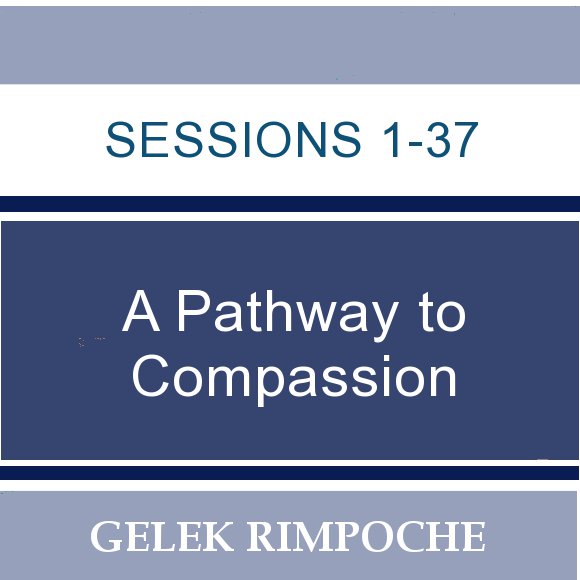
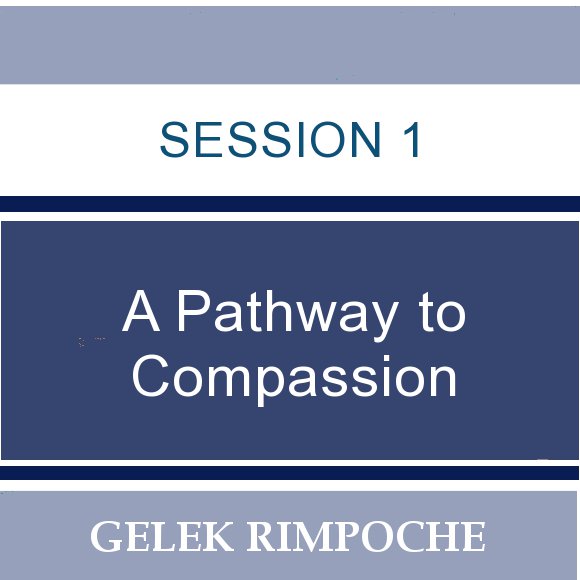
Session 1: A Pathway to Compassion
Session 1 of 37
In this lesson Gelek Rimpoche explains the goals of the retreat. The primary focus is an explanation of the Buddha’s wisdom regarding compassion, caring and love as it applies to serving others and includes information about how to deepen one’s spiritual practice, become free from suffering, and ultimately become a Buddha.
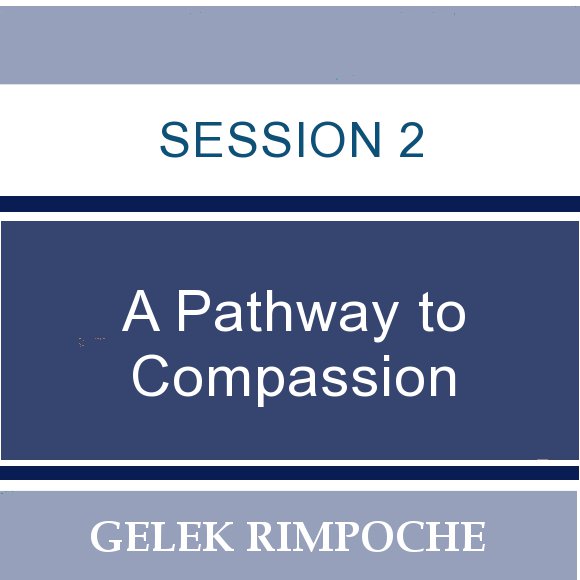
Session 2: A Pathway to Compassion
Session 2 of 37
In this lesson Gelek Rimpoche begins to discuss the spiritual techniques that allow one to be a kind, loving and compassionate practitioner dedicated to relieving pain and suffering of others. He points out that we also need help to relieve our own pain and suffering, and that Buddhism offers help. He describes the methods of Shamatha and Vipassana, and explains that both are needed to truly examine the nature of our lives. He points out that all of our suffering is ultimately based on delusion, ego and self-grasping.
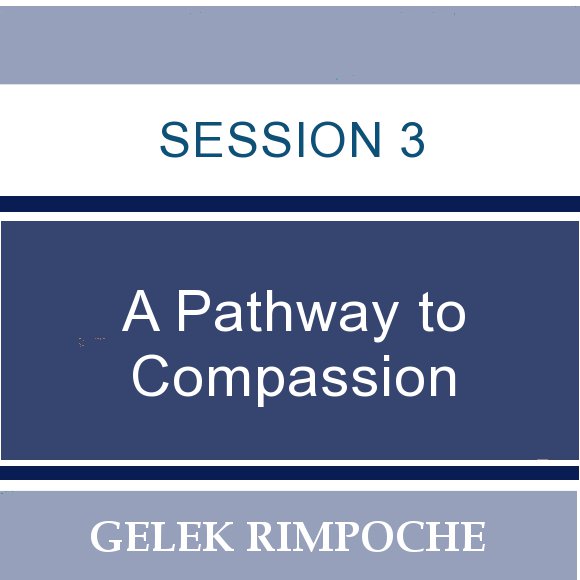
Session 3: A Pathway to Compassion
Session 3 of 37
This lesson begins with explanation of the practices including the invocation, dedication and the Four Immeasurables. Rimpoche explains what it means to overcome evil forces and know all things perfectly, through examples and stories from the life of the Buddha and great masters of the past.
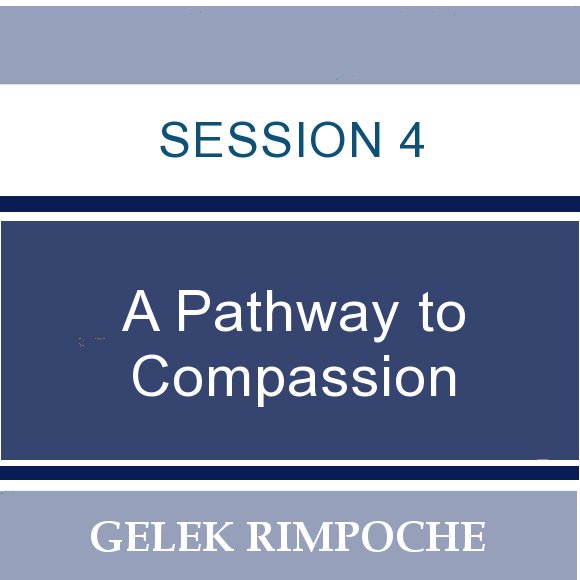
Session 4: A Pathway to Compassion
Session 4 of 37
Ego is the source of all of our confusion. This confusion is the source of our suffering. Changing the mind is the only way to overcome this confusion. Enlightened beings have cut through this confusion and know all things perfectly.
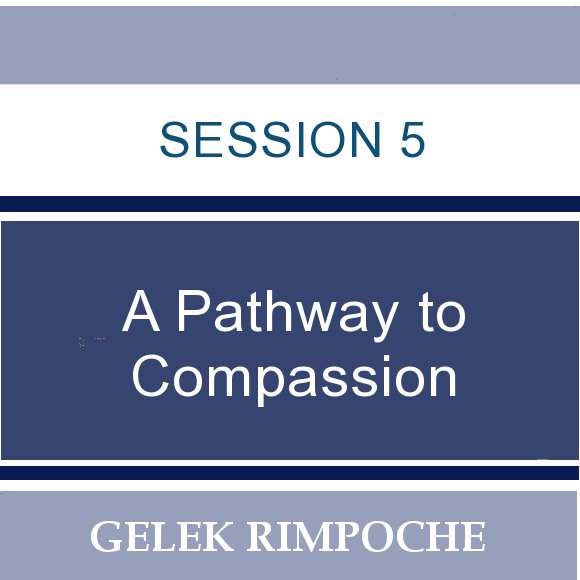
Session 5: A Pathway to Compassion
Session 5 of 37
In this lesson Rimpoche introduces and explains the elements of the Seven Limbs practice: prostration, offering, purification, rejoicing, requesting to remain, requesting guidance and dedication as well as karma and how it transcends simple cause and effect.
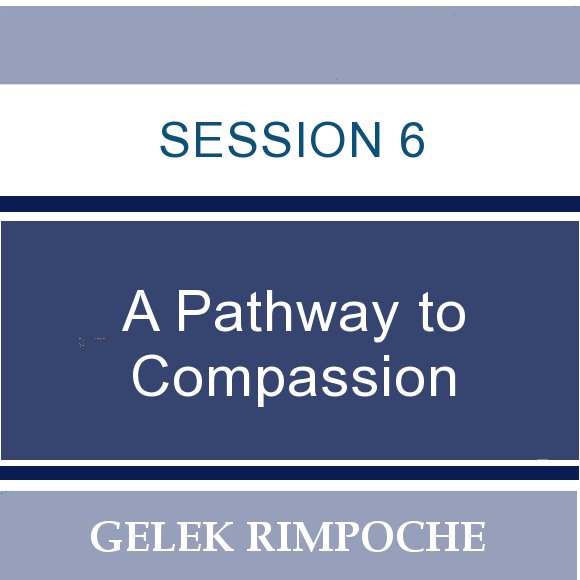
Session 6: A Pathway to Compassion
Session 6 of 37
How can we purify our negativities? Rimpoche discusses in detail the four powers of recognition, regret, antidote action and rejoicing. He explains how our negativities can be purified, and karma changed, because of impermanence.
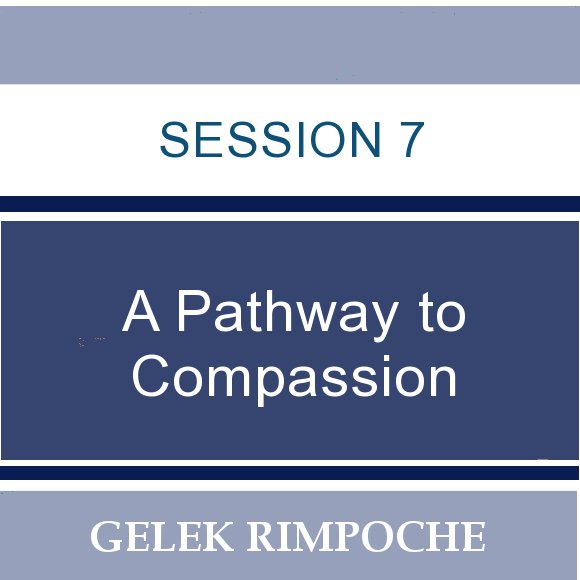
Session 7: A Pathway to Compassion
Session 7 of 37
In this lesson Rimpoche further elaborates on purification, particularly the power of recognition and regret. Recognition allows purification. Regret is what prevents repetition of negative actions and generates the resolve to not repeat them.
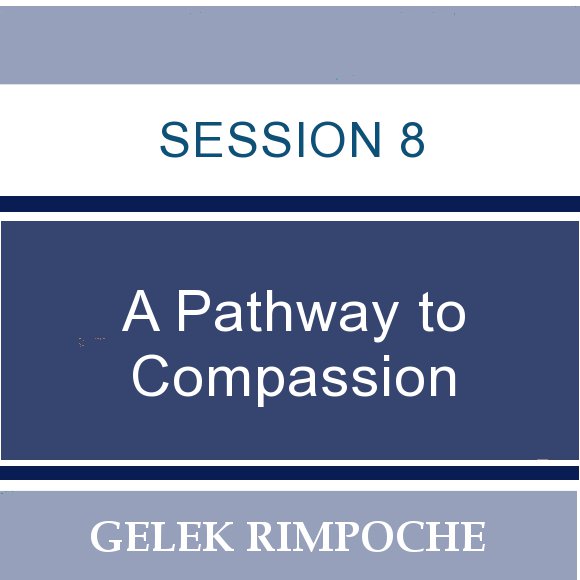
Session 8: A Pathway to Compassion
Session 8 of 37
Rimpoche discusses and answers the following questions: What are divine beings? & Can love and compassion overcome hatred in the world?
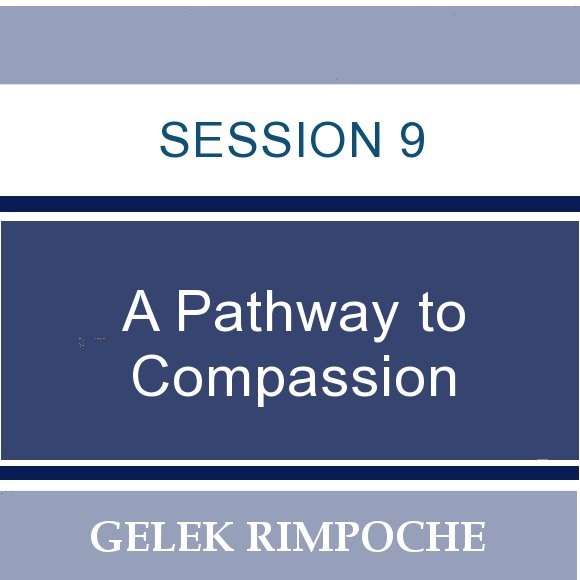
Session 9: A Pathway to Compassion
Session 9 of 37
Rimpoche discusses and answers the following questions: How can one deal with the vulnerability of being open and compassionate? & Can you please explain the purpose and practice of analytical meditation?
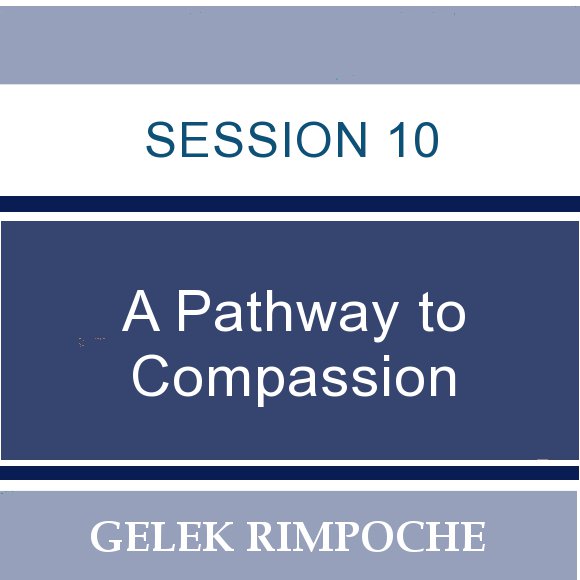
Session 10: A Pathway to Compassion
Session 10 of 37
In this lesson Gelek Rimpoche concludes the subject of purification. Carrying out antidote actions and rejoicing in good deeds is the way to get away from the habitual power of negativities. Rimpoche states that perfect purification is the result of understanding the wisdom of emptiness.
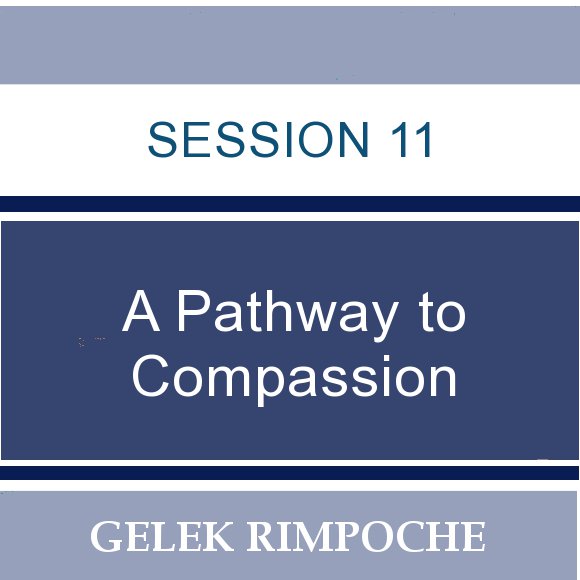
Session 11: A Pathway to Compassion
Session 11 of 37
Rimpoche explains the purpose of dedication of merit to preserve good karma, using the analogy of adding our drop of water to the ocean. He discusses the three types of suffering.
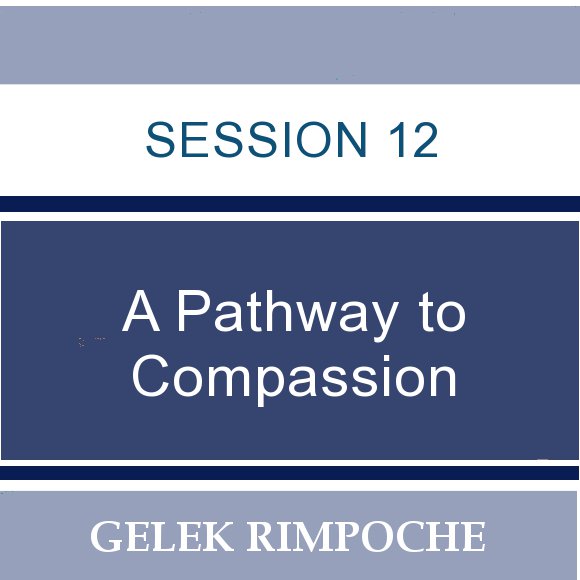
Session 12: A Pathway to Compassion
Session 12 of 37
Rimpoche reminds us to turn compassion inward, and not get lost in outward busyness.
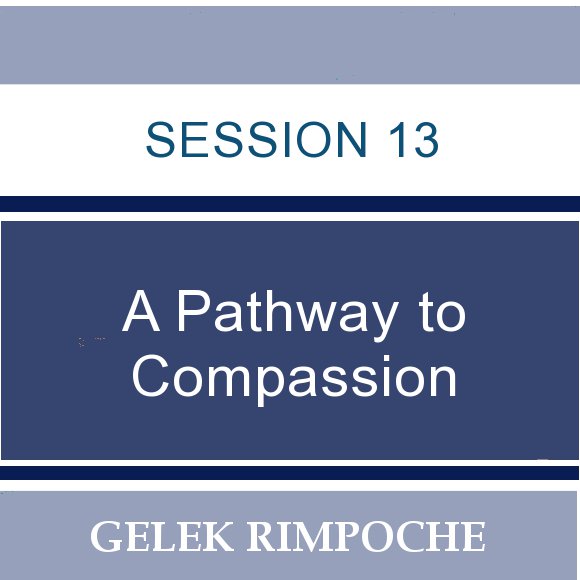
Session 13: A Pathway to Compassion
Session 13 of 37
In this lesson Rimpoche explains that true spirituality requires us to change our negativities into positive virtuous acts, and turn self-grasping into wisdom. Jealousy must be changed into a force for spiritual growth. In that way we can defeat our addiction to negativity. Our current life is capable to achieve this.
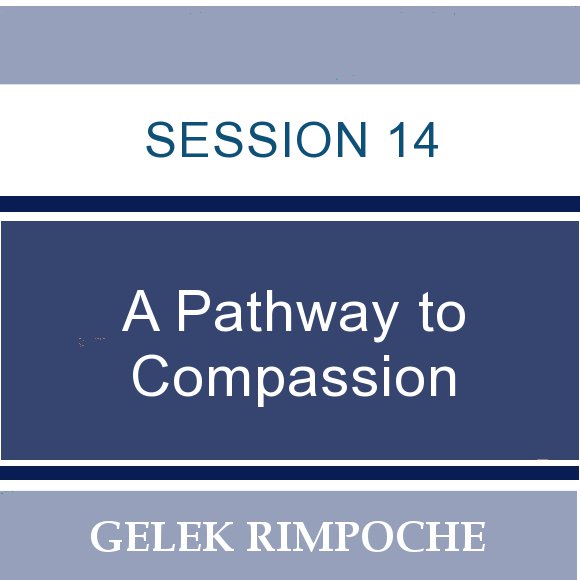
Session 14: A Pathway to Compassion
Session 14 of 37
In this lesson Rimpoche underlines the importance of using our spiritual opportunity while we have the chance. We now have access to profound teachings and can achieve spiritual attainment. But we take time for everything except for helping ourselves along the spiritual path. We must resolve to use this opportunity, and help ourselves, before it comes to an end.
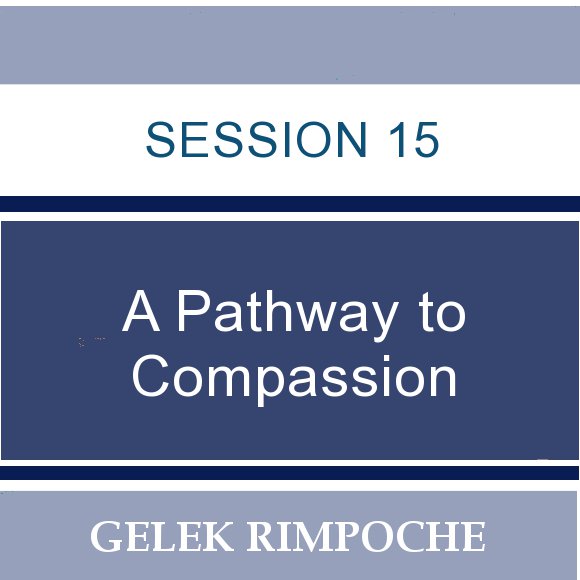
Session 15: A Pathway to Compassion
Session 15 of 37
In this lesson Rimpoche responds to questions about the difference between self-respect and self-cherishing. He explains that self-cherishing is the mind that is willing to sacrifice everything and everyone for one’s own benefit.
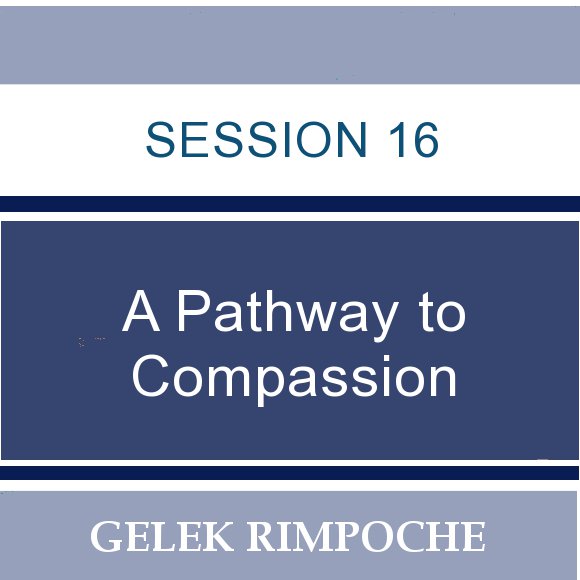
Session 16: A Pathway to Compassion
Session 16 of 37
How can we avoid the burn-out and stress that can arise when helping others? Rimpoche’s answer is to first develop self-compassion to help ourselves and to use meditation and our spiritual practice to stay grounded.
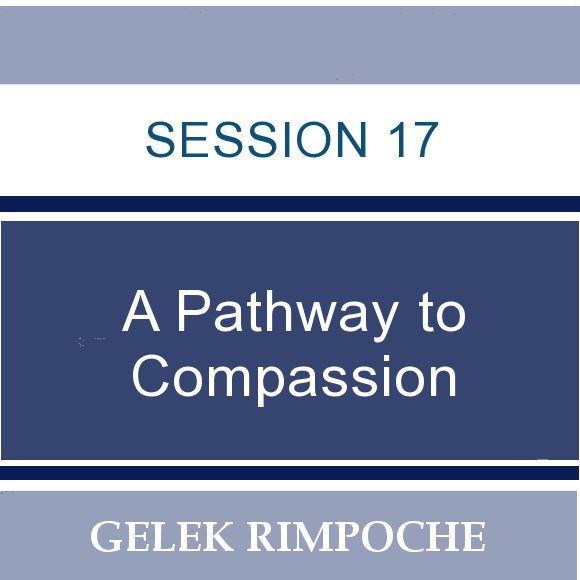
Session 17: A Pathway to Compassion
Session 17 of 37
In this lesson Gelek Rimpoche answers some critical questions: How can we know the joy that has never known suffering? & What can we do with the pain we take on while helping others? Rimpoche suggests the thought transformation method of using the pain of others as the lightening that destroys the rock of one’s own ego.
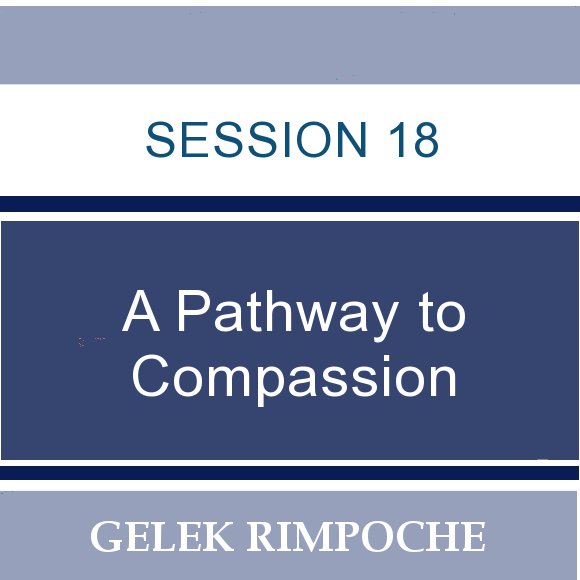
Session 18: A Pathway to Compassion
Session 16 of 37
How can we make sure we take advantage of the spiritual opportunities our modern life affords us? In this lesson Gelek Rimpoche cautions against laziness that can keep us from taking advantage of this powerful opportunity. He says it is best to make spiritual practice an ornament, rather than a burden and points out that this opportunity is limited. We are not here forever.
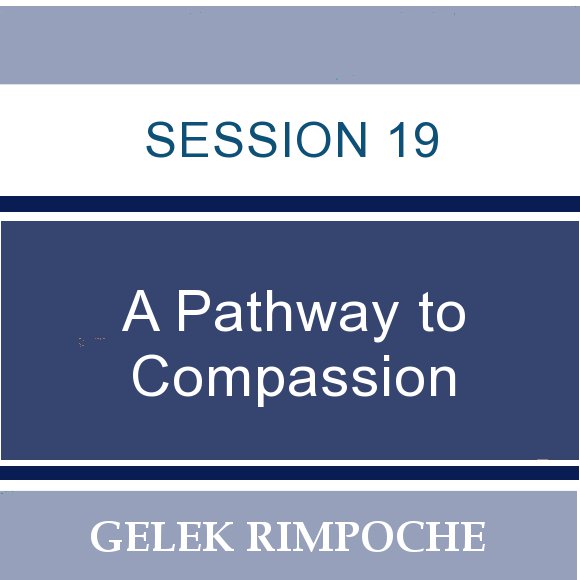
Session 19: A Pathway to Compassion
Session 19 of 37
In this lesson Rimpoche draws our attention to the sobering reality of our death by highlighting three important points: Death is certain. Life cannot be extended, and the moment of death is unknown. This body is weak, life is fragile and we can take nothing at the end.
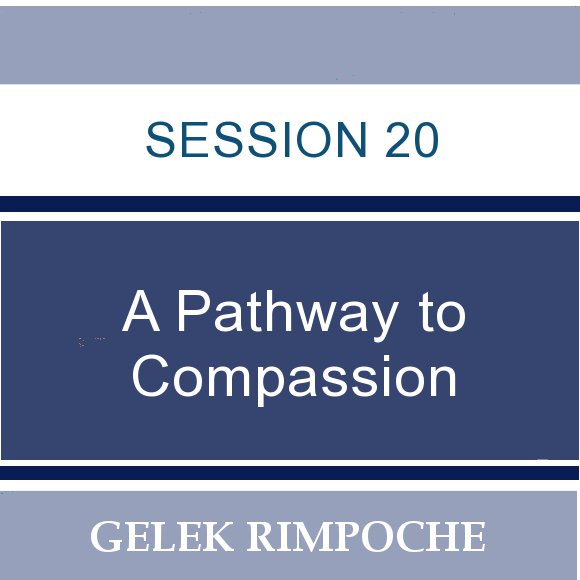
Session 20: A Pathway to Compassion
Session 20 of 37
What can help us at the point of dying? In this lesson Rimpoche explains that spiritual understanding is the most helpful. He advises us to remain unattached at the moment of death, and look back and appreciate the life we have had. That will make the transition easier.
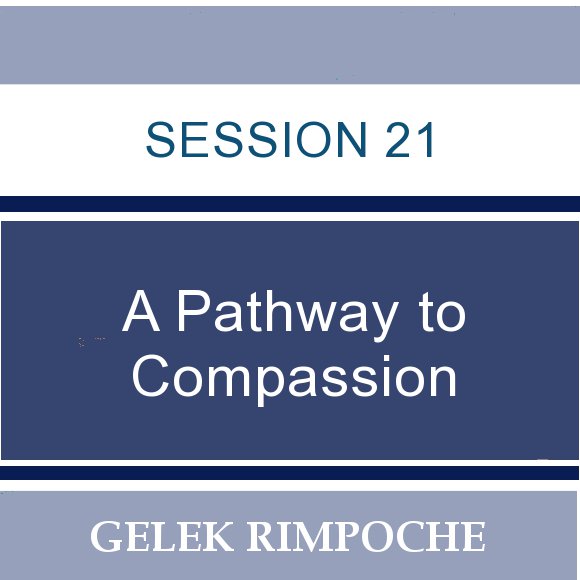
Session 21: A Pathway to Compassion
Session 21 of 37
Life is the union of body and mind, death is the separation of these two. Rimpoche discusses the stages of dying in terms of the dissolution of the four elements, earth, water, fire and air.
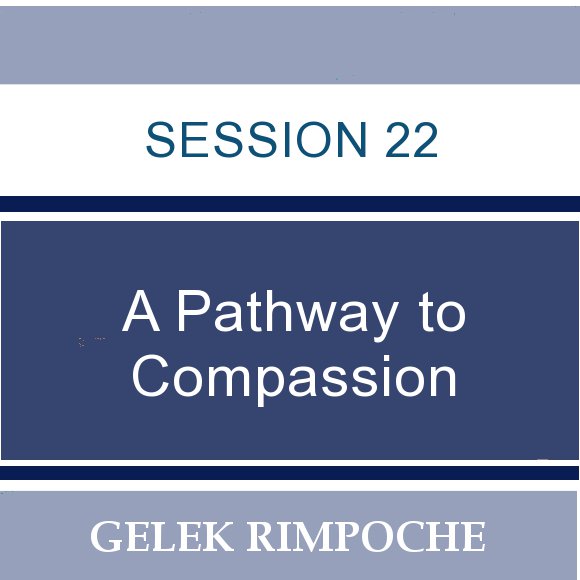
Session 22: A Pathway to Compassion
Session 22 of 37
In this lesson Rimpoche goes into greater detail about what happens at the time of death, and explains in detail the eight stages of dissolution.
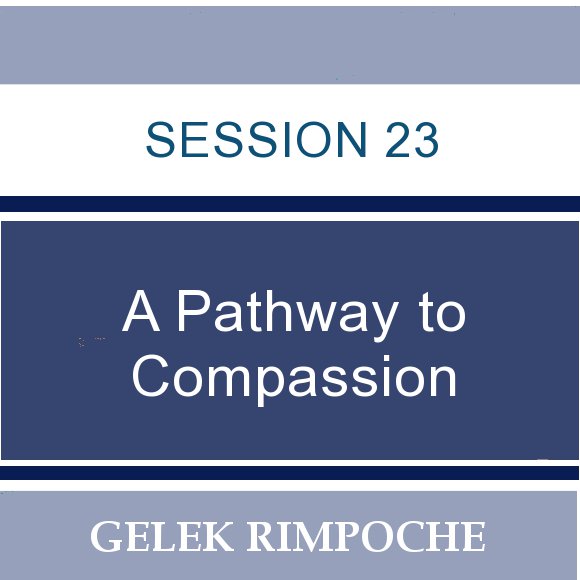
Session 23: A Pathway to Compassion
Session 23 of 37
Rimpoche answers questions relating to the death process, including questions about drug use near death and disturbing the body after death
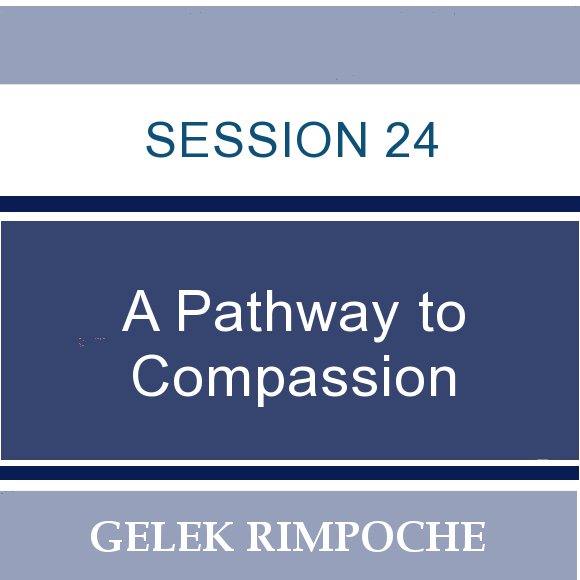
Session 24: A Pathway to Compassion
Session 24 of 37
Rimpoche answers additional questions about the stages of the death process.
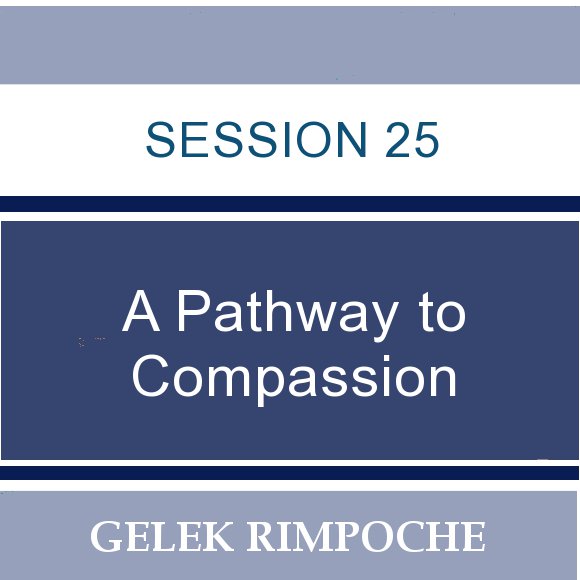
Session 25: A Pathway to Compassion
Session 25 of 37
In this lesson Rimpoche discusses the characteristics of karma in greater detail. Karma is definite, it is fast growing, you will not meet the result that you have not created, and you will meet the result you have created. He points out that we are responsible for our own karma.
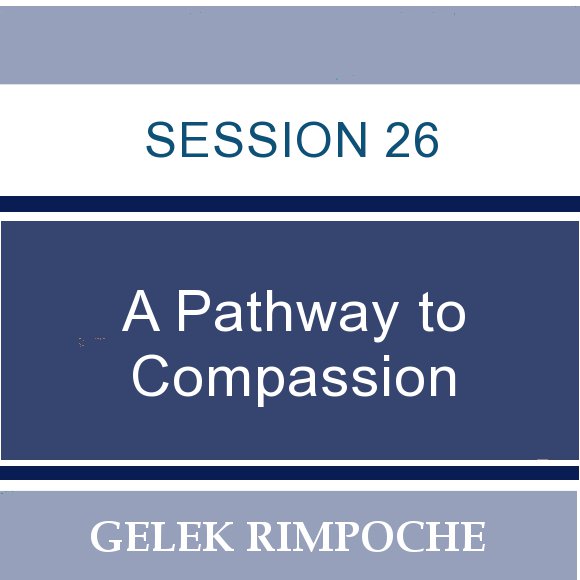
Session 26: A Pathway to Compassion
Session 26 of 37
In this lesson Gelek Rimpoche continues the discussion of karma, including explanations of how regret and purification change karma. He talks about the karma of disaster victims.
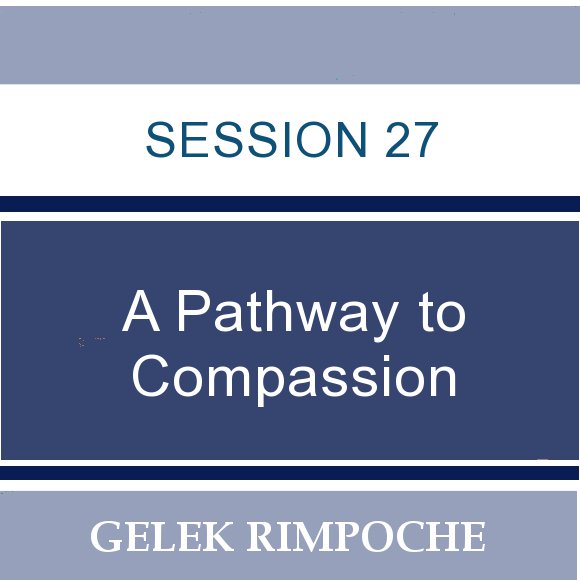
Session 27: A Pathway to Compassion
Session 27 of 37
Rimpoche relates a story about about a period of time when the Buddha and his monks stopped receiving food because of a past karma. He also discusses killing karma.
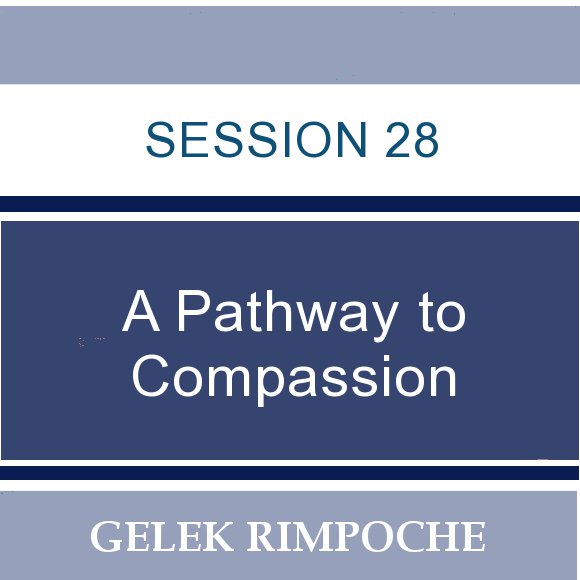
Session 28: A Pathway to Compassion
Session 28 of 37
In this lesson Rimpoche discusses the difference between heavy and light karma and explains that we can make bad karma light and good karma heavy. He explains how regret is a determining factor.
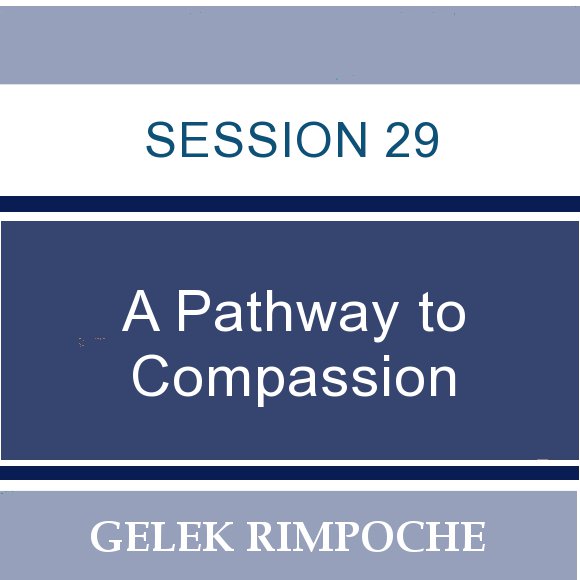
Session 29: A Pathway to Compassion
Session 29 of 37
Rimpoche discusses result karma, breaking it down into characteristics, thought, action, delusion and conclusion. He explains the three results of karma; direct, similar and experiential.
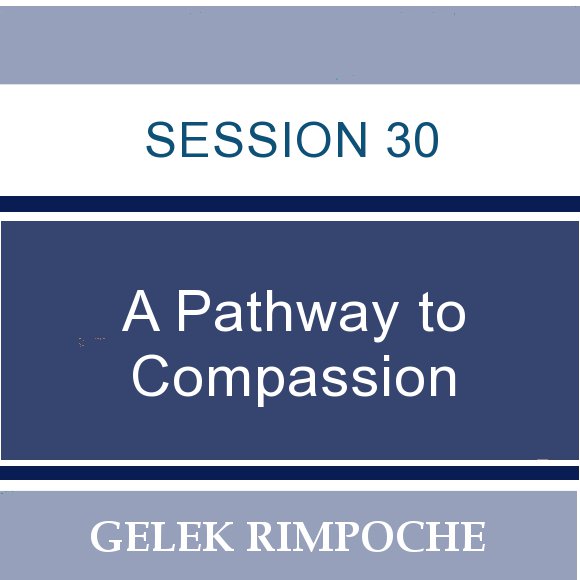
Session 30: A Pathway to Compassion
Session 30 of 37
In this lesson Rimpoche answers questions about karma, including the karma of unavoidable actions, and the karma of those who direct others, like generals in times of war.
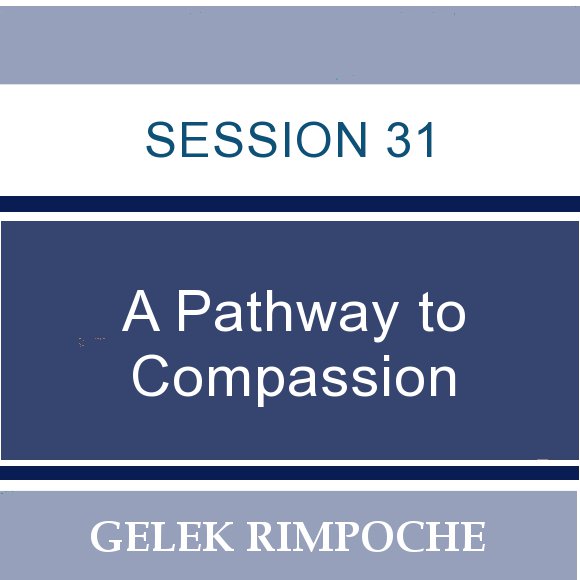
Session 31: A Pathway to Compassion
Session 31 of 37
Rimpoche answers questions about karma, including the karma of actions which have both good and bad effects.
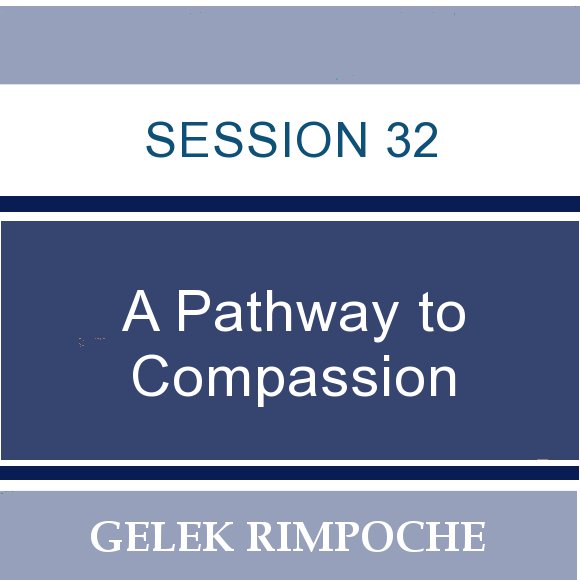
Session 32: A Pathway to Compassion
Session 32 of 37
Rimpoche explains that suffering offers us an opportunity to be of service. It is possible to help those who are suffering. Those who are suffering should not be ignored.
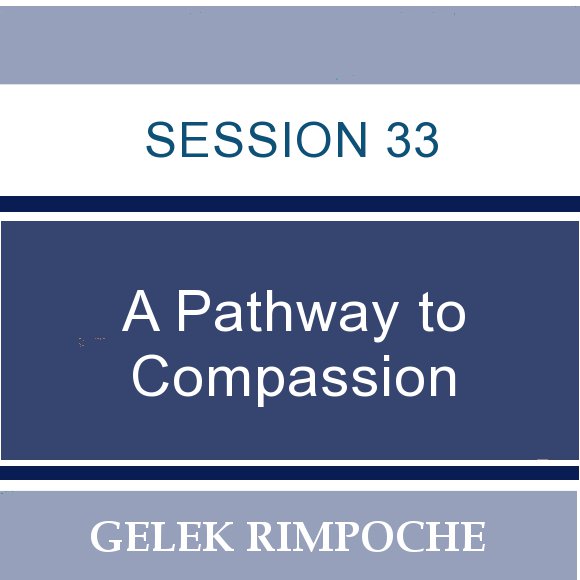
Session 33: A Pathway to Compassion
Session 33 of 37
In this lesson Gelek Rimpoche points out that one does not have to be a Buddhist to take advantage of purification through the four powers. He also offers suggestions to maintain the awareness created during the retreat in everyday life.
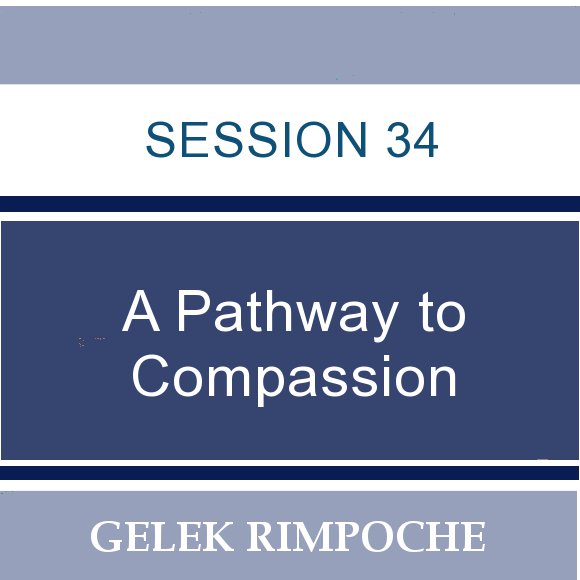
Session 34: A Pathway to Compassion
Session 34 of 37
Rimpoche reviews the topics covered during the retreat, including the seven limbed practice and the acknowledgement of the preciousness of human life. He recommends that we appreciate and value ourselves, and take advantage of this rare opportunity to help others and ourselves.
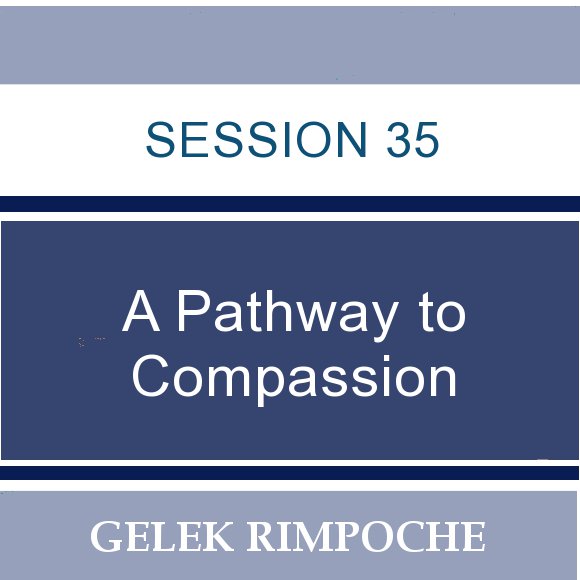
Session 35: A Pathway to Compassion
Session 35 of 37
In this lesson Rimpoche discusses the motivation to benefit all beings, including ourselves. He suggests that we renounce ego, hatred and obsession from a perspective based on self-compassion.
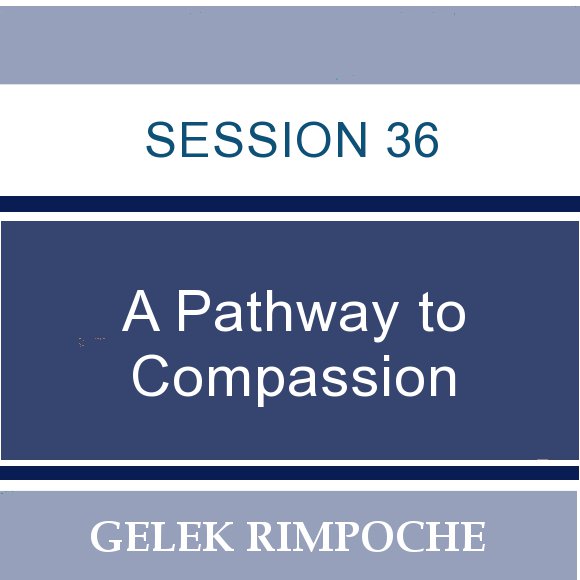
Session 36: A Pathway to Compassion
Session 36 of 37
In this lesson Gelek Rimpoche clarifies that suffering is the result of ego-grasping and negative emotions. Renouncing these negativities is the way to to show love and compassion towards ourselves. We can cut the causes of suffering by understanding the Four Noble Truths.
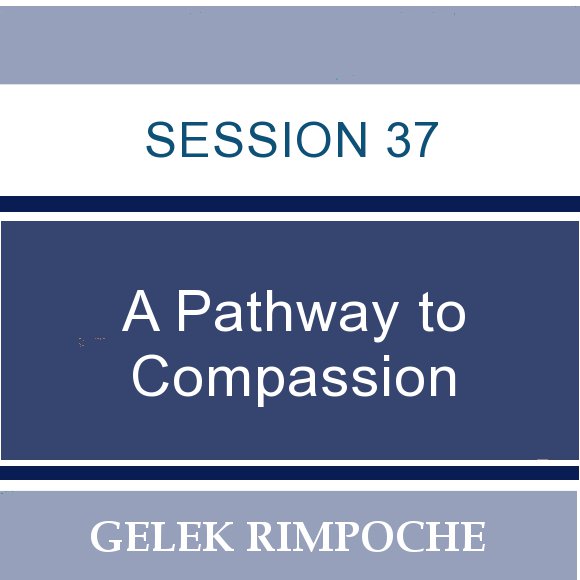
Session 37: A Pathway to Compassion
Session 37 of 37
Rimpoche reminds in this final lesson that compassion towards ourselves and others is our karmic responsibility. That kindness and compassion allows us to be happy in life.

